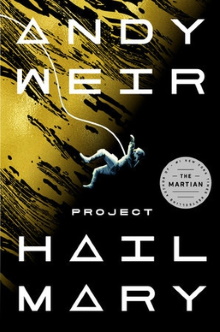I’ve been getting better lately about reading newer books and what could be more current than the newest book by Andy Weir that has just been released and is already at the top of all of the science-fiction sales charts. I liked The Martian enough that I probably would have picked it up eventually but after Amazon offered me a special discount after I had downloaded a sample but stopped short of buying the full book for a week or so. I wonder if this promotion was offered to everyone or the algorithm just picked me, anyway so here I am.
A man wakes up alone, tended by robotic arms and with no memory of who he is and where he is. Being of a scientific bent, he performs some simple tests and determines that he is onboard a spaceship. He also sees two desiccated corpses, presumably his fellow crewmembers. After he explores his surroundings and gains access to the control room, he learns that he isn’t even in the Solar system. By concentrating, he experiences flashbacks that help him recall his past, in particular that his name is Ryland Grace and he was a lowly science teacher in high school. However when Earth detected that the sun’s light was dimming and a probe sent to investigate the phenomenon discovers that the cause is an alien single-celled microorganism, he is tapped to help as he once theorized about the existence of non-water-based life forms. The governments of the world, faced with the extinction of humanity, vest absolute authority in a task force to find a solution. Grace becomes the assistant and science advisor to the head of this task force, Eva Stratt and he is the one who gives the alien life form a name: the Astrophage.
The novel has a pretty awkward structure as it insists on maintaining these twin narratives throughout the book of Grace on board the spaceship in the present while showing the events that lead up to it through flashbacks. This is a familiar way of easing the reader into the world as well as the crisis it is experiencing plus Weir has extra reason to do it this way: it lets him show off how intelligent his protagonist is by working out where he is and why by observation and reasoning from first principles. While I usually like this sort of thing, I think this novel takes the pedagogy too far as Grace uses manual calculations for too many things. For example, instead of learning to navigate the interface of the computers he finds, he actually measures the pixels on the screen. The novel is unnecessarily drawn out longer as a result of these trivial observations and insights. It gets better later as he makes truly novel and noteworthy discoveries but the early parts are kind of annoying to get through due to this excessive need to have Weir learn everything through experimentation. You really feel like shouting at him to just ask the computer for a manual to read already.
At the same time, I do have to credit Weir for some truly cool and new ideas. The Astrophage is a rather unique alien lifeform in science-fiction and I loved following along as Earth scientists rush to uncover the secrets of its lifecycle and why and how it travels back and forth between the Sun and Venus. I don’t want to give away too many spoilers here as this is the kind of book where it does matter but I will note that Grace runs into more alien biology later and the entire process of discovery and mutual understanding, documented in exacting detail in the book, is amazing to read as well. I especially appreciated how Weir plausibly establishes how technological development can progress along radically different paths, but the scientific process does lead to the objective truth of how the physical universe works. As other reviewers have noted, all this detail is certain to please fans who loved The Martian as the operation of scientific instruments and the entire process of Grace’s reasoning are covered in-depth.
The science for the most part seems pretty solid and is easily comprehensible. I do think it understates the grunt work that goes into conducting serious science and it seems rather unbelievable that Grace is able to breed meaningfully different changes in an alien microorganism in a matter of months. At the same time, it likes to throw curveballs and challenges at Grace, even at the very last moment, by having him make lazy mistakes and oversee critical precautions to take. Some of this can be explained by Grace being isolated and being under stress, not to mention having problems with amnesia, but as others have pointed out, it should be pretty standard to rely on checklists to make sure the crew hasn’t forgotten anything and the ship’s computer even if it’s not a true AI, should still be programmed to at least ask Grace to follow checklists. I’d prefer it if problems just because science is hard not because Grace keeps making mistakes.
This novel didn’t get off on the right foot with me as I was irritated by having the main character start off being amnesiac and how long it takes for Grace to pull himself together. In general, it still isn’t the best written book when it comes to Grace’s psychology who seems almost child-like at times. But as I became more engrossed in the quest to understand the nature of Earth’s crisis and the biology of Astrophage, my opinion of the novel improved and from the moment he makes another alien contact in another star system, the novel was an absolutely riveting read for me. Inevitably a film adaptation is already in the works though it seems challenging me to tell this story visually. Nevertheless I will be onboard when it arrives and I’d recommend this book to science-fiction fans too.
